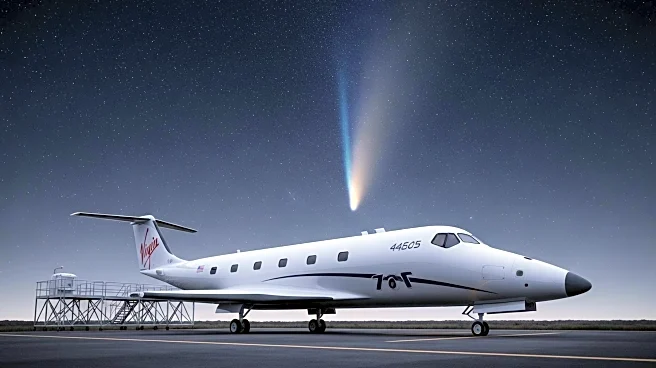What is the story about?
What's Happening?
Virgin Galactic has captured public interest with the idea of 'ATLAS Viewing Flights' to observe the interstellar comet 3I/ATLAS. However, the company remains focused on suborbital tourism rather than specialized astronomical observation missions. The interstellar comet, discovered by the NASA-funded ATLAS survey telescope, is currently traversing the solar system and has been a subject of study by scientific agencies like NASA and ESA. Virgin Galactic's current operations are centered on providing suborbital experiences, with plans to introduce the Delta class spaceships in 2026, aiming for increased flight frequency and capacity.
Why It's Important?
The concept of specialized astronomical viewing flights presents a potential future direction for space tourism, merging adventure with scientific observation. While Virgin Galactic's current focus is on suborbital tourism, the idea of offering unique celestial experiences could create a new niche in the market. This could lead to new revenue streams and technological advancements, but also highlights the challenges faced by Virgin Galactic in differentiating itself from competitors like Blue Origin and SpaceX. The company's profitability depends on the successful operation of its Delta class, and the absence of specialized offerings could limit its long-term appeal.
What's Next?
Virgin Galactic plans to begin Delta class flights in 2026, with a target of twice-weekly flights by 2028. The company may need to consider strategic pivots to include specialized astronomical tourism if market demand grows. This could involve developing spacecraft capable of stable, long-duration observation missions. The broader space tourism market is expected to grow significantly, with potential for orbital hotels and lunar tourism in the future. Companies that can innovate to offer unique space experiences will likely capture a significant share of the evolving market.
Beyond the Headlines
The potential for specialized astronomical tourism fits into the broader evolution of the space tourism industry, which is moving towards diverse and niche offerings. This trend could lead to increased competition and strategic partnerships between space tourism providers and scientific institutions. Regulatory frameworks for commercial spaceflight will need to evolve to address new safety protocols and environmental concerns. The allure of offering unique celestial encounters remains a powerful motivator for innovation in the space tourism sector.

















